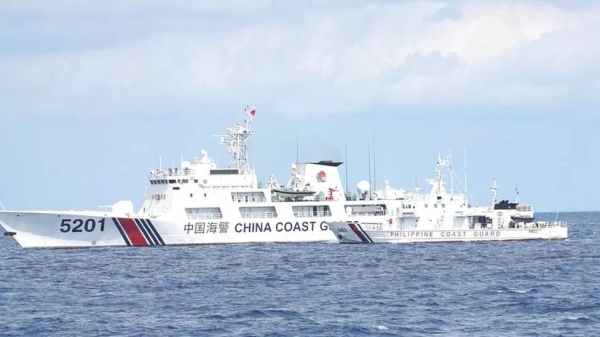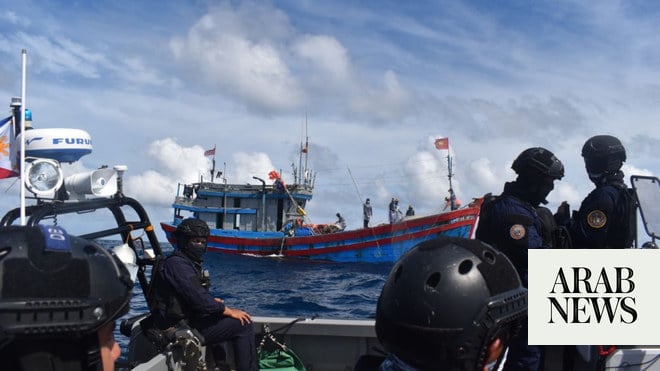
The Philippines has stepped up patrols in the disputed South China Sea ahead of the rollout of a new Chinese regulation that empowers its coast guard to detain foreigners accused of trespassing.
The regulation, which is effective from Saturday, marks a further escalation in tensions in the fiercely contested waterway, which is one of the world’s most economically important and busiest trading routes
Under the updated legislation, foreigners accused of illegally entering Chinese waters can be detained for up to 60 days without trial.
The Philippines President Ferdinand Marcos Jr has previously described new Chinese regulations as worrisome and an “escalation of the situation”.
He has also said that if any Filipino citizen is killed “by a wilful act” this would be very close to “an act of war”.
China claims almost 90% of the South China Sea – though an international tribunal in The Hague has rejected this. The Philippines, as well as Vietnam, Malaysia, Brunei and Taiwan also have overlapping claims.
There are growing concerns that as maritime confrontations in the waters increase, so too does the risk of a miscalculation that could inadvertently provoke conflict.
The Philippines has repeatedly accused China of dangerous behaviour, including firing water cannon and ramming its boats to disrupt Philippine Coast Guard missions. Such incidents have drawn warnings from the US, which has said it would defend the Philippines, a treaty ally, in the event of an armed attack on its public vessels, aircraft, and armed forces or its Coast Guard in the South China Sea.
Representatives of fishing groups have told Philippine media this week they are fearful about being detained at sea, but have no option but to continue as their livelihoods depend upon it.
China’s foreign ministry spokesperson, Mao Ning, has said the regulations are intended “to standardise the administrative law-enforcement procedures of Coast Guard agencies and better uphold order at sea,” and that “individuals and entities have no need for concern as long as they have not done anything illicit.”
The Philippines has increased its patrols ahead of the rules, according to Roy Vincent Trinidad, Philippine navy spokesperson for West Philippine Sea, who said the Philippines was working also with partners and allies in responding to the matter.
“We are not the only ones concerned, even other countries are concerned about that,” Trinidad told local media this week.
He said agencies were working to ensure Filipino fishing communities, who have long complained of harassment by Chinese vessels, will not be arrested. “Nothing will happen. The actions right now of the Philippine navy, the armed forces, the Coast Guard, Bureau of Fisheries and Aquatic Resources and all other maritime players of the Philippine government are preventing such a situation,” he said.
Collin Koh, Senior Fellow at the Institute of Defence and Strategic Studies at the S. Rajaratnam School of International Studies, said the new regulations were a form of “lawfare”.
“It is meant to intimidate, it is meant to threaten,” he said, adding that it was intended to remind countries such as the Philippines that China has a bigger navy and Coast Guard.
However, the wording of the law remained vague, said Koh. China’s Coast Guard Law, which was first introduced in 2021, applies to “maritime areas under Chinese jurisdiction”, but does not clearly define this. Were China to actually arrest Filipinos at sea, this would carry significant risks for Beijing, he added.
“What if in the process of trying to apprehend trespassers under the new guidelines, you clash with Philippine maritime forces, [and] somebody dies,” said Koh, adding this could then lead to the invocation of the Philippines’ mutual defence treaty with the US.
“This is a serious risk because when you start to apply the guidelines actively, then the risk of getting into an armed conflict becomes much higher.”
Applying the new law could also push the Philippines to advance its own legal challenges against China, said Koh.
The Philippines has previously said it is considering filing a new legal challenge against China in the Permanent Court of Arbitration in The Hague, accusing it of environmental damage within the Philippine’s exclusive economic zone – the waters that stretch for 200 nautical miles (370km) from a state’s coastline, and where a country has special rights to exploit resources and build.
China’s embassy in Manila did not respond to a request for comment.












